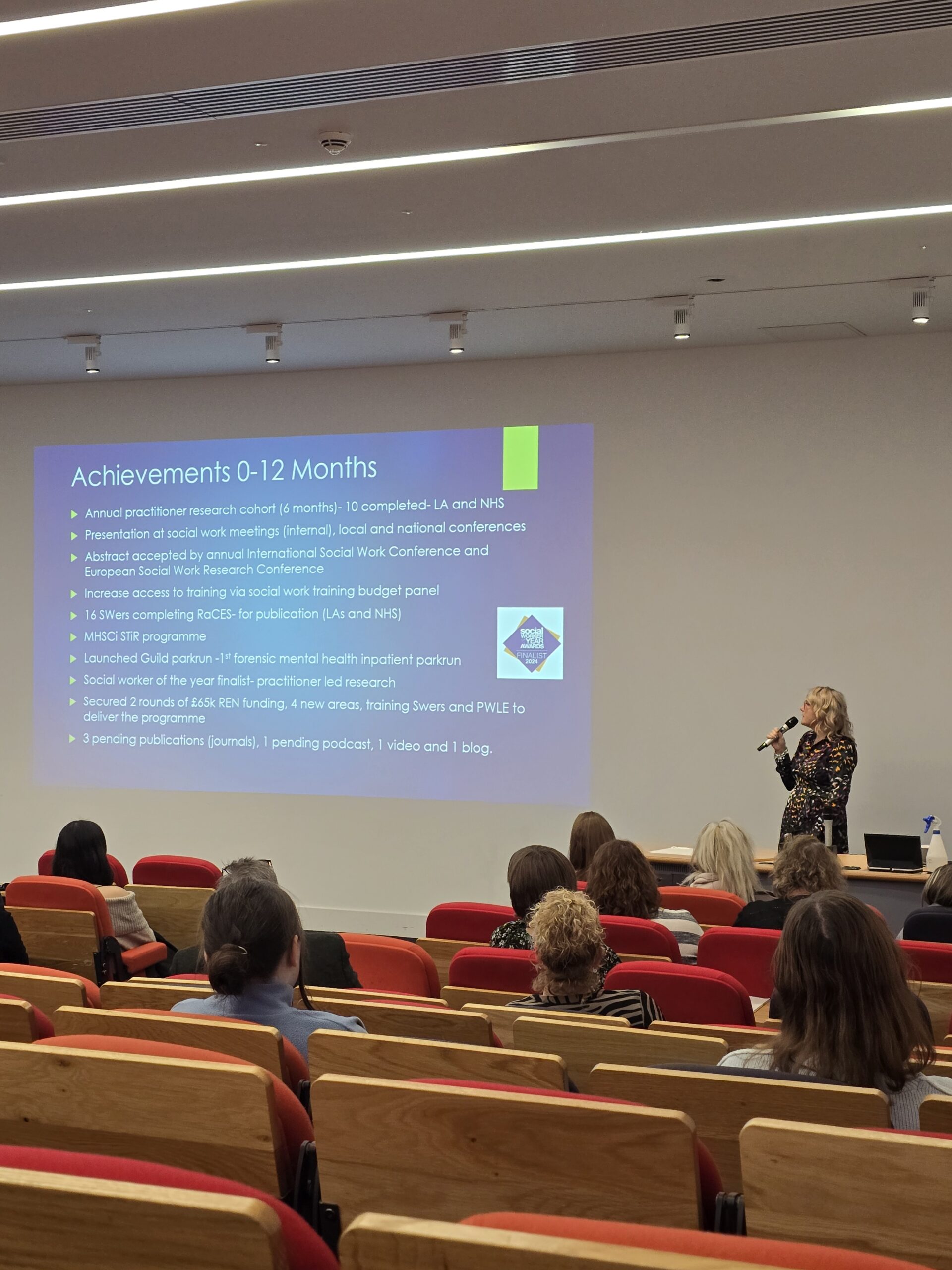Katy Cleece: A Champion for Social Care and the Transformative Power of Research

Katy Cleece, a social worker at Lancashire and South Cumbria NHS Foundation Trust, is not just advancing research in social work, she is a tireless advocate for transforming the field.
Through her leadership in three ARC NWC, Methodological Innovation, Development, Adaptation & Support Theme’s (MIDAS), Rapid Conversion of Evidence Summaries (RaCES) projects where she worked alongside Dr James Hill and Dr Katalin Ujhelyi Gomez, Katy has become a beacon of progress, blending academic insight with real-world practice to address the pressing challenges in children’s and adults social care.
Katy’s work on the RaCES projects highlights her commitment to enhancing social care. Speaking about her latest project, How can we strengthen the fragile relationship between families with mental health needs and children’s social care? Katy explained:
“Our goal was to cultivate research skills among social workers. At the same time, we saw an opportunity to involve service users in exploring research.”
“This innovative initiative brings together social workers from local authorities across Blackburn with Darwen, Lancashire County Council, Blackpool teaching hospital and Lancashire and South Cumbria Foundation Trust with service users, fostering a collaborative environment for learning and development.”
One standout achievement of Katy’s projects is an infographic titled ‘The Fragile Relationship Between Families and Children’s Social Care: How Can We Strengthen Our Umbrellas?’ This resource, developed jointly with service users input from service users, offers actionable strategies for social workers. “It’s designed to be practical and widely accessible,” Katy shared. “Its national distribution through Research in Practice ensures it reaches those who can make the most difference.”
Katy believes that, “True co-production means service users are equal partners, not just consulted.” Her approach ensures that service users lead at every stage, from shaping meeting structures to determining project outputs.”
The infographic’s creation highlights this approach. Service users, many of whom are in recovery, shaped its message and design. “The metaphor of umbrellas as protection from adversity was entirely their idea,” Katy noted. “They wanted something meaningful and immediately useful for practitioners.”
Katy’s work addresses the systemic issues that need addressing in children’s social care, including the need for trauma-informed practices. “Recovery is seldom straightforward,” she said. “Families often feel judged, not supported, which perpetuates mistrust and isolation.”
She advocates for integrating lived experiences into social work training. “Service users highlighted the importance of hearing directly from those who have experienced the system,” Katy explained. “This real-world perspective bridges the gap between theory and practice.”
The ripple effects of the RaCES projects continue to grow. Inspired by her work, one service user is now pursuing a research internship to explore the role of peer support for mothers during and after child removal. Another is pursuing a research internship to explore substance misuse rehab and the provision for mothers of residential vs community “Peer support is transformative,” Katy remarked.“It fosters understanding and connection in ways that professional interventions sometimes cannot.”
Katy’s work not only highlights the challenges within social care but also offers tangible solutions. “The system faces significant pressures,” she said. “However, by investing in early intervention and community-based support, we can prevent many cases from escalating.”
Katy highlighted “Social workers frequently struggle to find the time to read and embed research, or to undertake it, and many tell me they don’t see themselves as being able to connect with research because they feel it is hidden behind paywalls and complex language.”
“Through taking part in RaCES we are finding passion for doing research, demystifying it in a practical and usable way and creating pieces for other social workers to connect with. There has become a real buzz around research in our trust that is extending across colleagues in local authorities and NHS trust across the North West.”
Katy is a RaCES champion who, has been instrumental in disseminating and establishing RaCES projects across social work. Her efforts have been pivotal in championing knowledge transfer and workforce development, making her a key figure in advancing and developing RaCES within the field.
ARC NWC Research Fellow of the MIDAS team Joanna Harrison, said “Katy’s efforts are a testament to what can be achieved through determination, collaboration, and a clear vision. Katy’s leadership in the RaCES projects showcases the potential for social work to be both compassionate and innovative.”
“This work is just the beginning,” Katy reflected. “By empowering service users and practitioners to collaborate meaningfully, we are paving the way for a more effective and humane social care system.”
Through her advocacy and actions, Katy Cleece embodies what it means to be a true champion for social care, inspiring others to follow her lead in creating a brighter future for families and communities.